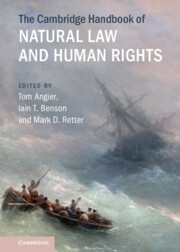Book contents
- The Cambridge Handbook of Natural Law and Human Rights
- The Cambridge Handbook of Natural Law and Human Rights
- Copyright page
- Contents
- Contributors
- Acknowledgements
- Introduction
- Part I Natural Law and the Origins of Human Rights
- Part II Natural Law Foundations of Human Rights Obligations
- Part III Natural Law and Human Rights within Religious Traditions
- Part IV The Human Person, Political Community, and Rule of Law
- Part V Rival Interpretations and Interpretive Principles
- 24 Moral Pluralism, Political Disagreement, and Human Rights
- 25 Human Rights Law and Adjudication
- 26 Natural Law and Human Rights amid the Legal Ruins of Liberal Scepticism, Values Language, and Global Resets
- 27 Human Rights and the Modes of Judicial Responsibility
- 28 The Right to Religious Freedom
- 29 Natural Law, Rights of the Family, and International Human Rights Instruments
- 30 Natural Law and Socioeconomic Rights
- 31 Solidarity and Global Allocation of COVID-19 Vaccines
- Part VI Challenges and Future Prospects
- Index
26 - Natural Law and Human Rights amid the Legal Ruins of Liberal Scepticism, Values Language, and Global Resets
from Part V - Rival Interpretations and Interpretive Principles
Published online by Cambridge University Press: 03 November 2022
- The Cambridge Handbook of Natural Law and Human Rights
- The Cambridge Handbook of Natural Law and Human Rights
- Copyright page
- Contents
- Contributors
- Acknowledgements
- Introduction
- Part I Natural Law and the Origins of Human Rights
- Part II Natural Law Foundations of Human Rights Obligations
- Part III Natural Law and Human Rights within Religious Traditions
- Part IV The Human Person, Political Community, and Rule of Law
- Part V Rival Interpretations and Interpretive Principles
- 24 Moral Pluralism, Political Disagreement, and Human Rights
- 25 Human Rights Law and Adjudication
- 26 Natural Law and Human Rights amid the Legal Ruins of Liberal Scepticism, Values Language, and Global Resets
- 27 Human Rights and the Modes of Judicial Responsibility
- 28 The Right to Religious Freedom
- 29 Natural Law, Rights of the Family, and International Human Rights Instruments
- 30 Natural Law and Socioeconomic Rights
- 31 Solidarity and Global Allocation of COVID-19 Vaccines
- Part VI Challenges and Future Prospects
- Index
Summary
This chapter argues that natural law duties and corresponding human rights require attention to moral and metaphysical frameworks, and education into moral traditions sustaining those frameworks. If such traditions are eclipsed, or lost for a time, there will be deformations in our understanding and language concerning the relationship between the self and the moral universe around us; and, thus, to our understanding and application of human rights. In particular, the chapter examines the shift in language from ‘virtue’ to ‘values’ and ‘person’ to ‘individual’. It explores how the abstracted concepts of ‘values’ and ‘individual’ create confusions in the application of human rights. Instead, it is argued that the moral language supporting human rights application should be sustained within a metaphysical tradition. And, for such traditions to thrive, they require subsidiarity for what Habermas calls ‘life-worlds’ – the many and varied voluntary associations that make up human life in community. Without commitment to subsidiarity, the pursuit of mere techné will undercut the moral sources embedded within those life-worlds, which nourish understanding of and respect for human rights.
Keywords
- Type
- Chapter
- Information
- The Cambridge Handbook of Natural Law and Human Rights , pp. 385 - 401Publisher: Cambridge University PressPrint publication year: 2022

